Stakeholder Collaboration: Crisis Management at Rosewood Hotel London
VerifiedAdded on 2023/06/12
|24
|6064
|331
Case Study
AI Summary
This case study explores the emerging ways of collaborating with stakeholders in the hospitality industry, focusing on Rosewood Hotel London's approach to crisis management. It evaluates the concept of crisis management, analyzes emerging collaboration methods with stakeholder groups, and identifies challenges faced by organizations in overcoming crisis situations. The research employs a qualitative approach, using thematic analysis of interviews with five Rosewood Hotel stakeholders to understand their perspectives on stakeholder collaboration during crises like the Covid-19 pandemic. The study reviews literature on crisis management, stakeholder collaboration, and challenges in the hospitality sector, highlighting the importance of collective planning and decision-making. Ultimately, the research aims to provide recommendations for addressing challenges in crisis management within the hospitality industry.
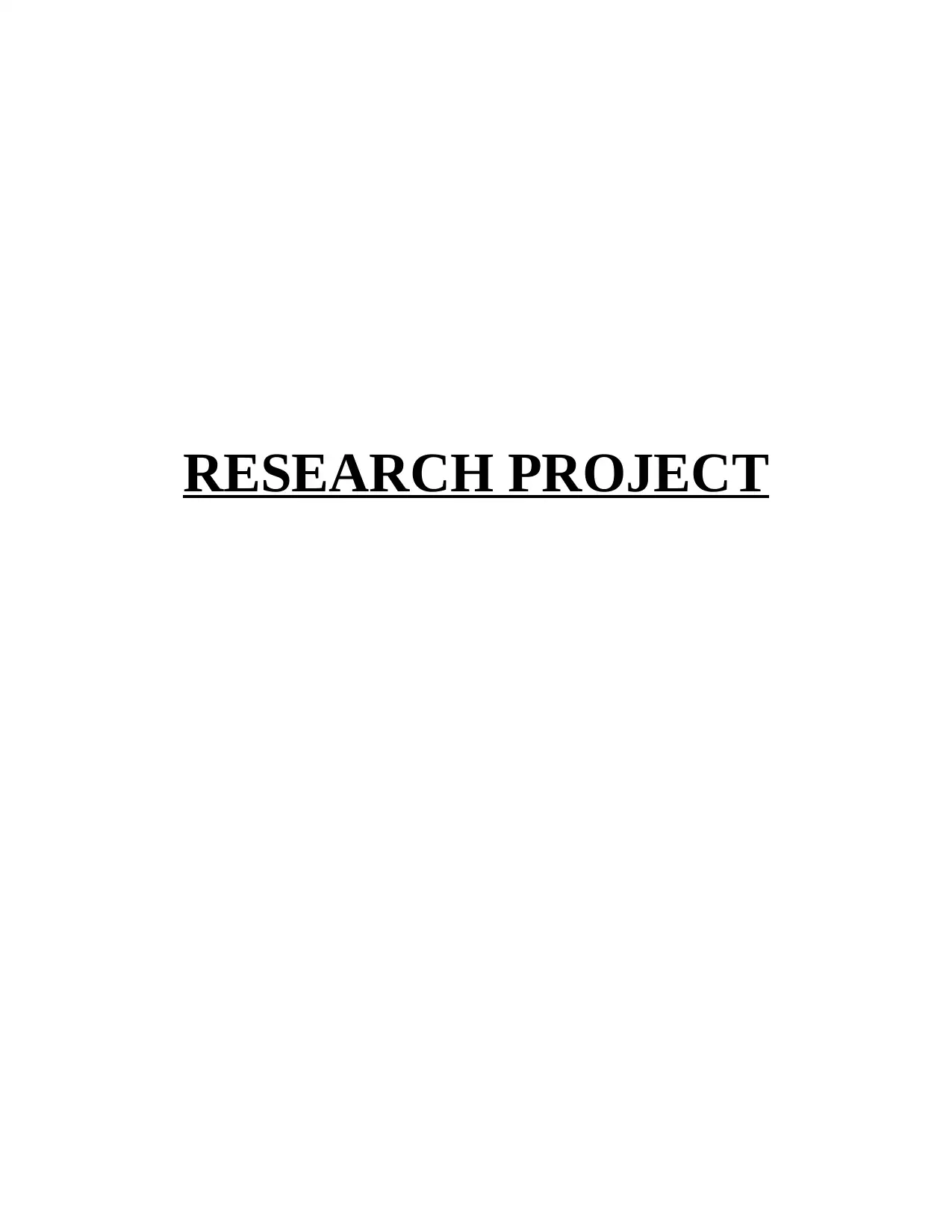
RESEARCH PROJECT
Paraphrase This Document
Need a fresh take? Get an instant paraphrase of this document with our AI Paraphraser
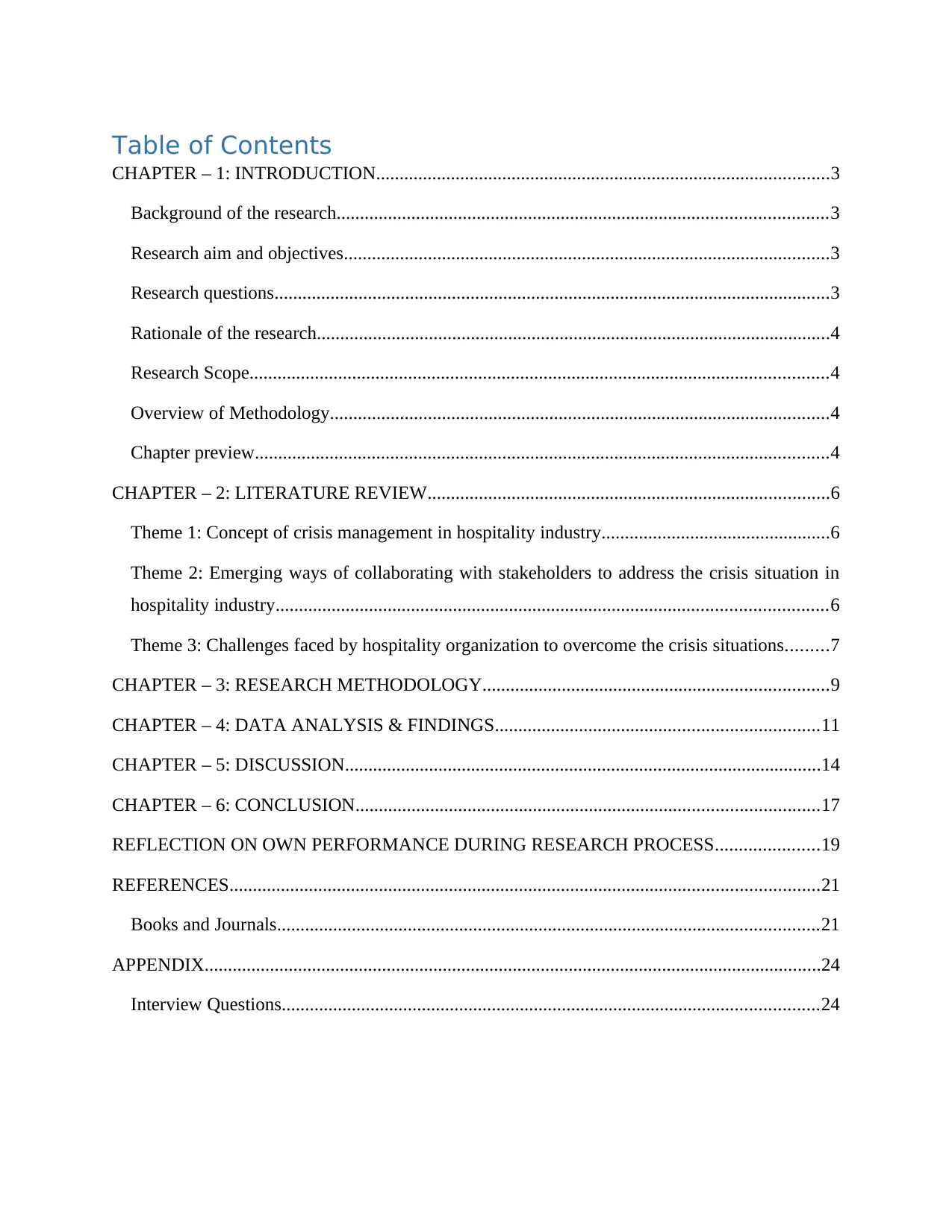
Table of Contents
CHAPTER – 1: INTRODUCTION.................................................................................................3
Background of the research.........................................................................................................3
Research aim and objectives........................................................................................................3
Research questions.......................................................................................................................3
Rationale of the research..............................................................................................................4
Research Scope............................................................................................................................4
Overview of Methodology...........................................................................................................4
Chapter preview...........................................................................................................................4
CHAPTER – 2: LITERATURE REVIEW......................................................................................6
Theme 1: Concept of crisis management in hospitality industry.................................................6
Theme 2: Emerging ways of collaborating with stakeholders to address the crisis situation in
hospitality industry......................................................................................................................6
Theme 3: Challenges faced by hospitality organization to overcome the crisis situations.........7
CHAPTER – 3: RESEARCH METHODOLOGY..........................................................................9
CHAPTER – 4: DATA ANALYSIS & FINDINGS.....................................................................11
CHAPTER – 5: DISCUSSION......................................................................................................14
CHAPTER – 6: CONCLUSION...................................................................................................17
REFLECTION ON OWN PERFORMANCE DURING RESEARCH PROCESS......................19
REFERENCES..............................................................................................................................21
Books and Journals....................................................................................................................21
APPENDIX....................................................................................................................................24
Interview Questions...................................................................................................................24
CHAPTER – 1: INTRODUCTION.................................................................................................3
Background of the research.........................................................................................................3
Research aim and objectives........................................................................................................3
Research questions.......................................................................................................................3
Rationale of the research..............................................................................................................4
Research Scope............................................................................................................................4
Overview of Methodology...........................................................................................................4
Chapter preview...........................................................................................................................4
CHAPTER – 2: LITERATURE REVIEW......................................................................................6
Theme 1: Concept of crisis management in hospitality industry.................................................6
Theme 2: Emerging ways of collaborating with stakeholders to address the crisis situation in
hospitality industry......................................................................................................................6
Theme 3: Challenges faced by hospitality organization to overcome the crisis situations.........7
CHAPTER – 3: RESEARCH METHODOLOGY..........................................................................9
CHAPTER – 4: DATA ANALYSIS & FINDINGS.....................................................................11
CHAPTER – 5: DISCUSSION......................................................................................................14
CHAPTER – 6: CONCLUSION...................................................................................................17
REFLECTION ON OWN PERFORMANCE DURING RESEARCH PROCESS......................19
REFERENCES..............................................................................................................................21
Books and Journals....................................................................................................................21
APPENDIX....................................................................................................................................24
Interview Questions...................................................................................................................24
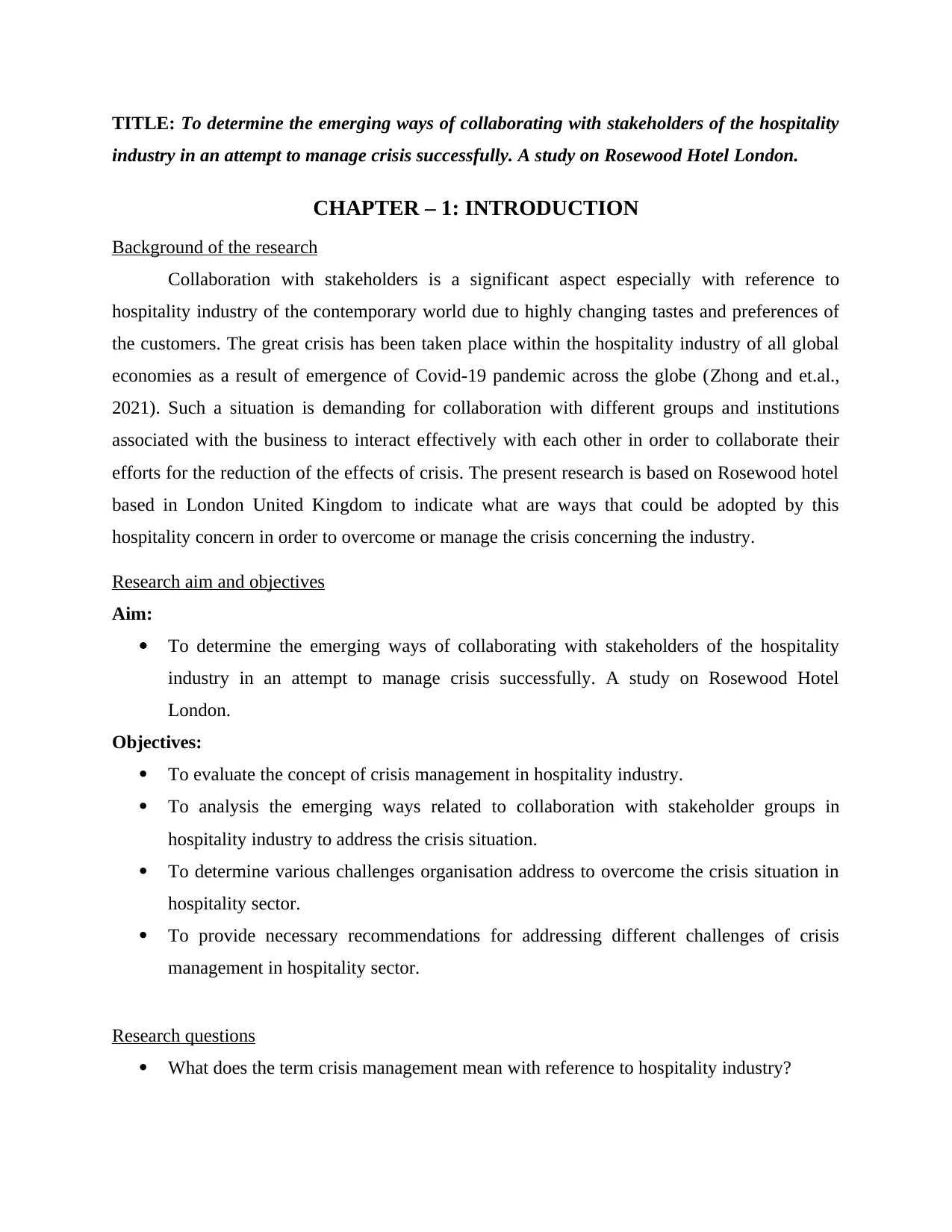
TITLE: To determine the emerging ways of collaborating with stakeholders of the hospitality
industry in an attempt to manage crisis successfully. A study on Rosewood Hotel London.
CHAPTER – 1: INTRODUCTION
Background of the research
Collaboration with stakeholders is a significant aspect especially with reference to
hospitality industry of the contemporary world due to highly changing tastes and preferences of
the customers. The great crisis has been taken place within the hospitality industry of all global
economies as a result of emergence of Covid-19 pandemic across the globe (Zhong and et.al.,
2021). Such a situation is demanding for collaboration with different groups and institutions
associated with the business to interact effectively with each other in order to collaborate their
efforts for the reduction of the effects of crisis. The present research is based on Rosewood hotel
based in London United Kingdom to indicate what are ways that could be adopted by this
hospitality concern in order to overcome or manage the crisis concerning the industry.
Research aim and objectives
Aim:
To determine the emerging ways of collaborating with stakeholders of the hospitality
industry in an attempt to manage crisis successfully. A study on Rosewood Hotel
London.
Objectives:
To evaluate the concept of crisis management in hospitality industry.
To analysis the emerging ways related to collaboration with stakeholder groups in
hospitality industry to address the crisis situation.
To determine various challenges organisation address to overcome the crisis situation in
hospitality sector.
To provide necessary recommendations for addressing different challenges of crisis
management in hospitality sector.
Research questions
What does the term crisis management mean with reference to hospitality industry?
industry in an attempt to manage crisis successfully. A study on Rosewood Hotel London.
CHAPTER – 1: INTRODUCTION
Background of the research
Collaboration with stakeholders is a significant aspect especially with reference to
hospitality industry of the contemporary world due to highly changing tastes and preferences of
the customers. The great crisis has been taken place within the hospitality industry of all global
economies as a result of emergence of Covid-19 pandemic across the globe (Zhong and et.al.,
2021). Such a situation is demanding for collaboration with different groups and institutions
associated with the business to interact effectively with each other in order to collaborate their
efforts for the reduction of the effects of crisis. The present research is based on Rosewood hotel
based in London United Kingdom to indicate what are ways that could be adopted by this
hospitality concern in order to overcome or manage the crisis concerning the industry.
Research aim and objectives
Aim:
To determine the emerging ways of collaborating with stakeholders of the hospitality
industry in an attempt to manage crisis successfully. A study on Rosewood Hotel
London.
Objectives:
To evaluate the concept of crisis management in hospitality industry.
To analysis the emerging ways related to collaboration with stakeholder groups in
hospitality industry to address the crisis situation.
To determine various challenges organisation address to overcome the crisis situation in
hospitality sector.
To provide necessary recommendations for addressing different challenges of crisis
management in hospitality sector.
Research questions
What does the term crisis management mean with reference to hospitality industry?
⊘ This is a preview!⊘
Do you want full access?
Subscribe today to unlock all pages.

Trusted by 1+ million students worldwide
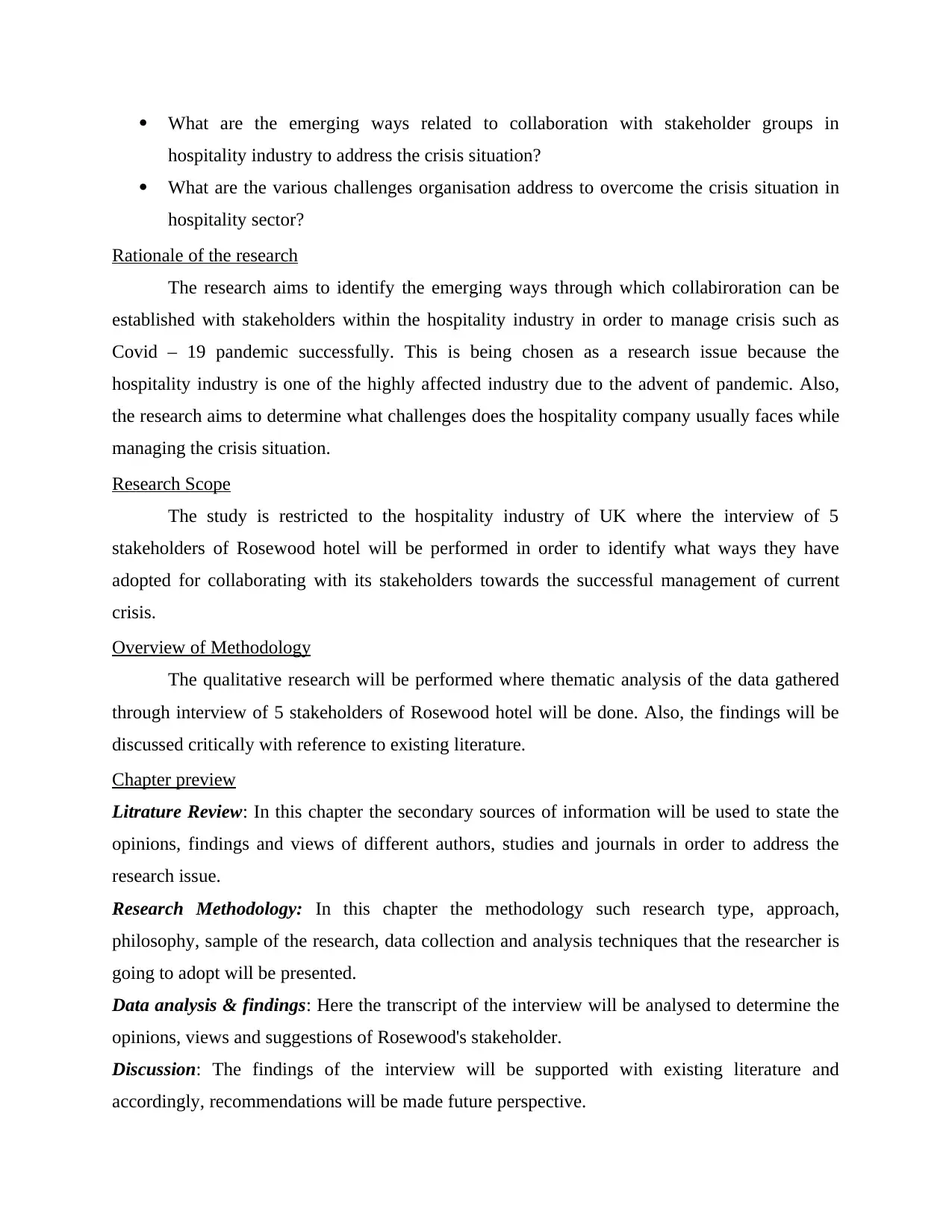
What are the emerging ways related to collaboration with stakeholder groups in
hospitality industry to address the crisis situation?
What are the various challenges organisation address to overcome the crisis situation in
hospitality sector?
Rationale of the research
The research aims to identify the emerging ways through which collabiroration can be
established with stakeholders within the hospitality industry in order to manage crisis such as
Covid – 19 pandemic successfully. This is being chosen as a research issue because the
hospitality industry is one of the highly affected industry due to the advent of pandemic. Also,
the research aims to determine what challenges does the hospitality company usually faces while
managing the crisis situation.
Research Scope
The study is restricted to the hospitality industry of UK where the interview of 5
stakeholders of Rosewood hotel will be performed in order to identify what ways they have
adopted for collaborating with its stakeholders towards the successful management of current
crisis.
Overview of Methodology
The qualitative research will be performed where thematic analysis of the data gathered
through interview of 5 stakeholders of Rosewood hotel will be done. Also, the findings will be
discussed critically with reference to existing literature.
Chapter preview
Litrature Review: In this chapter the secondary sources of information will be used to state the
opinions, findings and views of different authors, studies and journals in order to address the
research issue.
Research Methodology: In this chapter the methodology such research type, approach,
philosophy, sample of the research, data collection and analysis techniques that the researcher is
going to adopt will be presented.
Data analysis & findings: Here the transcript of the interview will be analysed to determine the
opinions, views and suggestions of Rosewood's stakeholder.
Discussion: The findings of the interview will be supported with existing literature and
accordingly, recommendations will be made future perspective.
hospitality industry to address the crisis situation?
What are the various challenges organisation address to overcome the crisis situation in
hospitality sector?
Rationale of the research
The research aims to identify the emerging ways through which collabiroration can be
established with stakeholders within the hospitality industry in order to manage crisis such as
Covid – 19 pandemic successfully. This is being chosen as a research issue because the
hospitality industry is one of the highly affected industry due to the advent of pandemic. Also,
the research aims to determine what challenges does the hospitality company usually faces while
managing the crisis situation.
Research Scope
The study is restricted to the hospitality industry of UK where the interview of 5
stakeholders of Rosewood hotel will be performed in order to identify what ways they have
adopted for collaborating with its stakeholders towards the successful management of current
crisis.
Overview of Methodology
The qualitative research will be performed where thematic analysis of the data gathered
through interview of 5 stakeholders of Rosewood hotel will be done. Also, the findings will be
discussed critically with reference to existing literature.
Chapter preview
Litrature Review: In this chapter the secondary sources of information will be used to state the
opinions, findings and views of different authors, studies and journals in order to address the
research issue.
Research Methodology: In this chapter the methodology such research type, approach,
philosophy, sample of the research, data collection and analysis techniques that the researcher is
going to adopt will be presented.
Data analysis & findings: Here the transcript of the interview will be analysed to determine the
opinions, views and suggestions of Rosewood's stakeholder.
Discussion: The findings of the interview will be supported with existing literature and
accordingly, recommendations will be made future perspective.
Paraphrase This Document
Need a fresh take? Get an instant paraphrase of this document with our AI Paraphraser

Conclusion: The summary of the entire research will be presented in this chapter.
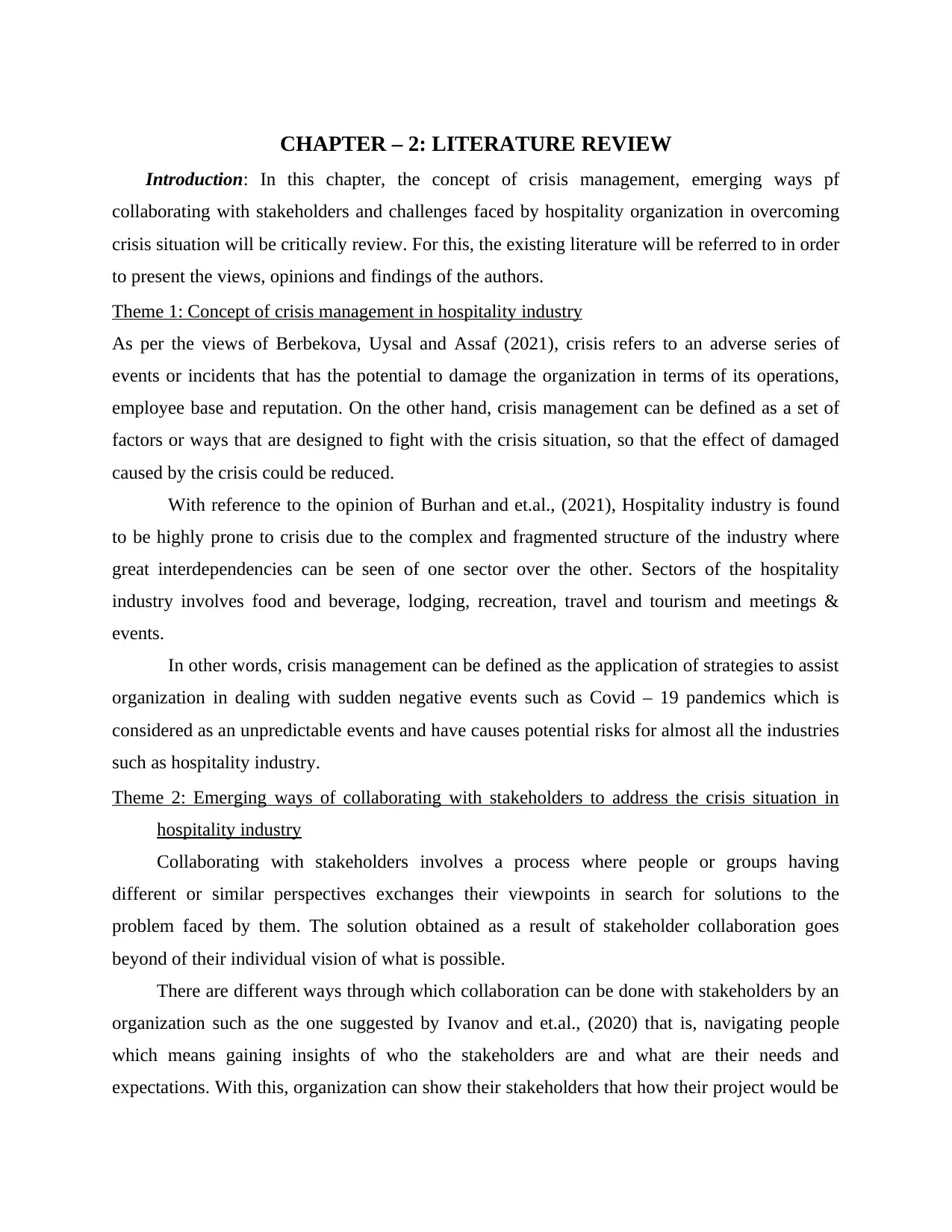
CHAPTER – 2: LITERATURE REVIEW
Introduction: In this chapter, the concept of crisis management, emerging ways pf
collaborating with stakeholders and challenges faced by hospitality organization in overcoming
crisis situation will be critically review. For this, the existing literature will be referred to in order
to present the views, opinions and findings of the authors.
Theme 1: Concept of crisis management in hospitality industry
As per the views of Berbekova, Uysal and Assaf (2021), crisis refers to an adverse series of
events or incidents that has the potential to damage the organization in terms of its operations,
employee base and reputation. On the other hand, crisis management can be defined as a set of
factors or ways that are designed to fight with the crisis situation, so that the effect of damaged
caused by the crisis could be reduced.
With reference to the opinion of Burhan and et.al., (2021), Hospitality industry is found
to be highly prone to crisis due to the complex and fragmented structure of the industry where
great interdependencies can be seen of one sector over the other. Sectors of the hospitality
industry involves food and beverage, lodging, recreation, travel and tourism and meetings &
events.
In other words, crisis management can be defined as the application of strategies to assist
organization in dealing with sudden negative events such as Covid – 19 pandemics which is
considered as an unpredictable events and have causes potential risks for almost all the industries
such as hospitality industry.
Theme 2: Emerging ways of collaborating with stakeholders to address the crisis situation in
hospitality industry
Collaborating with stakeholders involves a process where people or groups having
different or similar perspectives exchanges their viewpoints in search for solutions to the
problem faced by them. The solution obtained as a result of stakeholder collaboration goes
beyond of their individual vision of what is possible.
There are different ways through which collaboration can be done with stakeholders by an
organization such as the one suggested by Ivanov and et.al., (2020) that is, navigating people
which means gaining insights of who the stakeholders are and what are their needs and
expectations. With this, organization can show their stakeholders that how their project would be
Introduction: In this chapter, the concept of crisis management, emerging ways pf
collaborating with stakeholders and challenges faced by hospitality organization in overcoming
crisis situation will be critically review. For this, the existing literature will be referred to in order
to present the views, opinions and findings of the authors.
Theme 1: Concept of crisis management in hospitality industry
As per the views of Berbekova, Uysal and Assaf (2021), crisis refers to an adverse series of
events or incidents that has the potential to damage the organization in terms of its operations,
employee base and reputation. On the other hand, crisis management can be defined as a set of
factors or ways that are designed to fight with the crisis situation, so that the effect of damaged
caused by the crisis could be reduced.
With reference to the opinion of Burhan and et.al., (2021), Hospitality industry is found
to be highly prone to crisis due to the complex and fragmented structure of the industry where
great interdependencies can be seen of one sector over the other. Sectors of the hospitality
industry involves food and beverage, lodging, recreation, travel and tourism and meetings &
events.
In other words, crisis management can be defined as the application of strategies to assist
organization in dealing with sudden negative events such as Covid – 19 pandemics which is
considered as an unpredictable events and have causes potential risks for almost all the industries
such as hospitality industry.
Theme 2: Emerging ways of collaborating with stakeholders to address the crisis situation in
hospitality industry
Collaborating with stakeholders involves a process where people or groups having
different or similar perspectives exchanges their viewpoints in search for solutions to the
problem faced by them. The solution obtained as a result of stakeholder collaboration goes
beyond of their individual vision of what is possible.
There are different ways through which collaboration can be done with stakeholders by an
organization such as the one suggested by Ivanov and et.al., (2020) that is, navigating people
which means gaining insights of who the stakeholders are and what are their needs and
expectations. With this, organization can show their stakeholders that how their project would be
⊘ This is a preview!⊘
Do you want full access?
Subscribe today to unlock all pages.

Trusted by 1+ million students worldwide
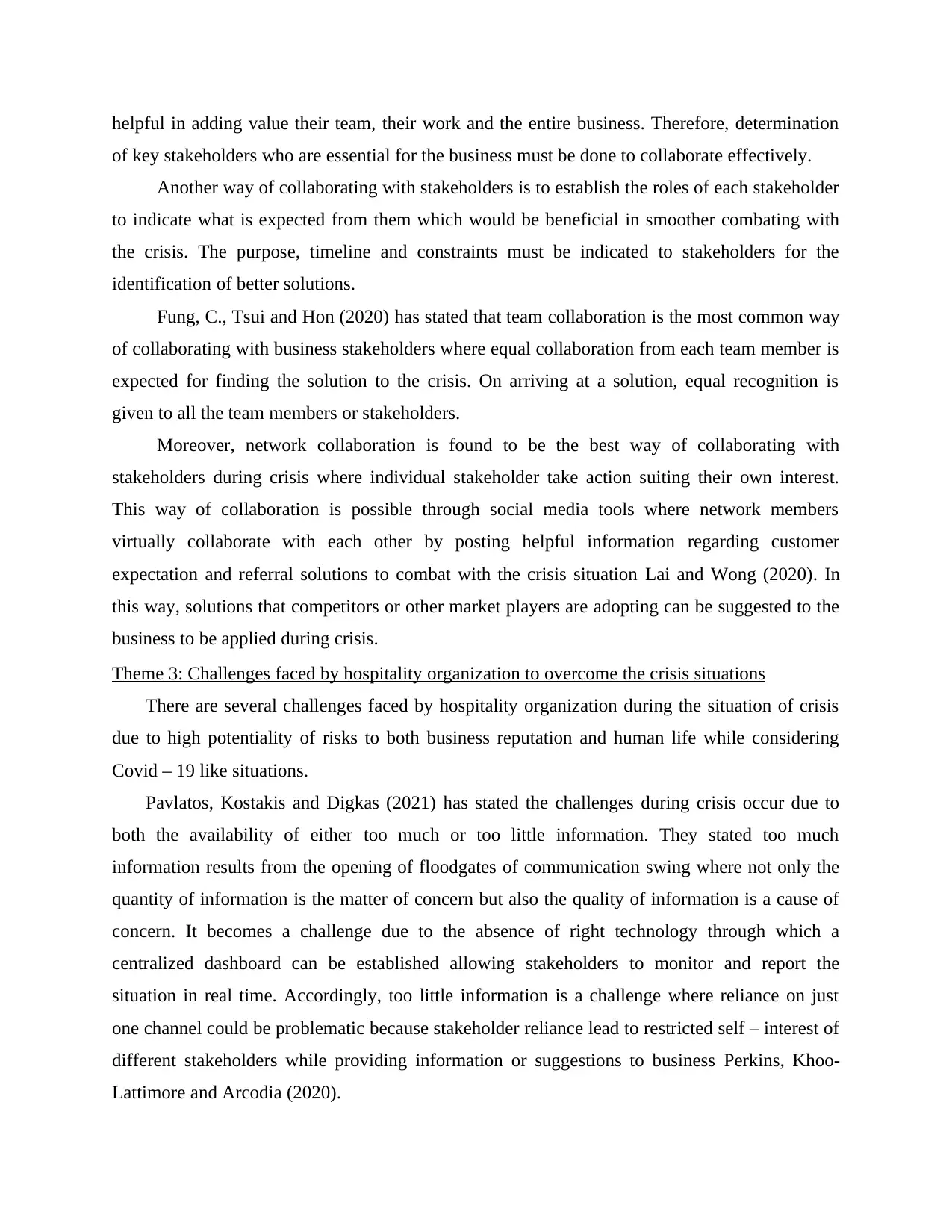
helpful in adding value their team, their work and the entire business. Therefore, determination
of key stakeholders who are essential for the business must be done to collaborate effectively.
Another way of collaborating with stakeholders is to establish the roles of each stakeholder
to indicate what is expected from them which would be beneficial in smoother combating with
the crisis. The purpose, timeline and constraints must be indicated to stakeholders for the
identification of better solutions.
Fung, C., Tsui and Hon (2020) has stated that team collaboration is the most common way
of collaborating with business stakeholders where equal collaboration from each team member is
expected for finding the solution to the crisis. On arriving at a solution, equal recognition is
given to all the team members or stakeholders.
Moreover, network collaboration is found to be the best way of collaborating with
stakeholders during crisis where individual stakeholder take action suiting their own interest.
This way of collaboration is possible through social media tools where network members
virtually collaborate with each other by posting helpful information regarding customer
expectation and referral solutions to combat with the crisis situation Lai and Wong (2020). In
this way, solutions that competitors or other market players are adopting can be suggested to the
business to be applied during crisis.
Theme 3: Challenges faced by hospitality organization to overcome the crisis situations
There are several challenges faced by hospitality organization during the situation of crisis
due to high potentiality of risks to both business reputation and human life while considering
Covid – 19 like situations.
Pavlatos, Kostakis and Digkas (2021) has stated the challenges during crisis occur due to
both the availability of either too much or too little information. They stated too much
information results from the opening of floodgates of communication swing where not only the
quantity of information is the matter of concern but also the quality of information is a cause of
concern. It becomes a challenge due to the absence of right technology through which a
centralized dashboard can be established allowing stakeholders to monitor and report the
situation in real time. Accordingly, too little information is a challenge where reliance on just
one channel could be problematic because stakeholder reliance lead to restricted self – interest of
different stakeholders while providing information or suggestions to business Perkins, Khoo-
Lattimore and Arcodia (2020).
of key stakeholders who are essential for the business must be done to collaborate effectively.
Another way of collaborating with stakeholders is to establish the roles of each stakeholder
to indicate what is expected from them which would be beneficial in smoother combating with
the crisis. The purpose, timeline and constraints must be indicated to stakeholders for the
identification of better solutions.
Fung, C., Tsui and Hon (2020) has stated that team collaboration is the most common way
of collaborating with business stakeholders where equal collaboration from each team member is
expected for finding the solution to the crisis. On arriving at a solution, equal recognition is
given to all the team members or stakeholders.
Moreover, network collaboration is found to be the best way of collaborating with
stakeholders during crisis where individual stakeholder take action suiting their own interest.
This way of collaboration is possible through social media tools where network members
virtually collaborate with each other by posting helpful information regarding customer
expectation and referral solutions to combat with the crisis situation Lai and Wong (2020). In
this way, solutions that competitors or other market players are adopting can be suggested to the
business to be applied during crisis.
Theme 3: Challenges faced by hospitality organization to overcome the crisis situations
There are several challenges faced by hospitality organization during the situation of crisis
due to high potentiality of risks to both business reputation and human life while considering
Covid – 19 like situations.
Pavlatos, Kostakis and Digkas (2021) has stated the challenges during crisis occur due to
both the availability of either too much or too little information. They stated too much
information results from the opening of floodgates of communication swing where not only the
quantity of information is the matter of concern but also the quality of information is a cause of
concern. It becomes a challenge due to the absence of right technology through which a
centralized dashboard can be established allowing stakeholders to monitor and report the
situation in real time. Accordingly, too little information is a challenge where reliance on just
one channel could be problematic because stakeholder reliance lead to restricted self – interest of
different stakeholders while providing information or suggestions to business Perkins, Khoo-
Lattimore and Arcodia (2020).
Paraphrase This Document
Need a fresh take? Get an instant paraphrase of this document with our AI Paraphraser
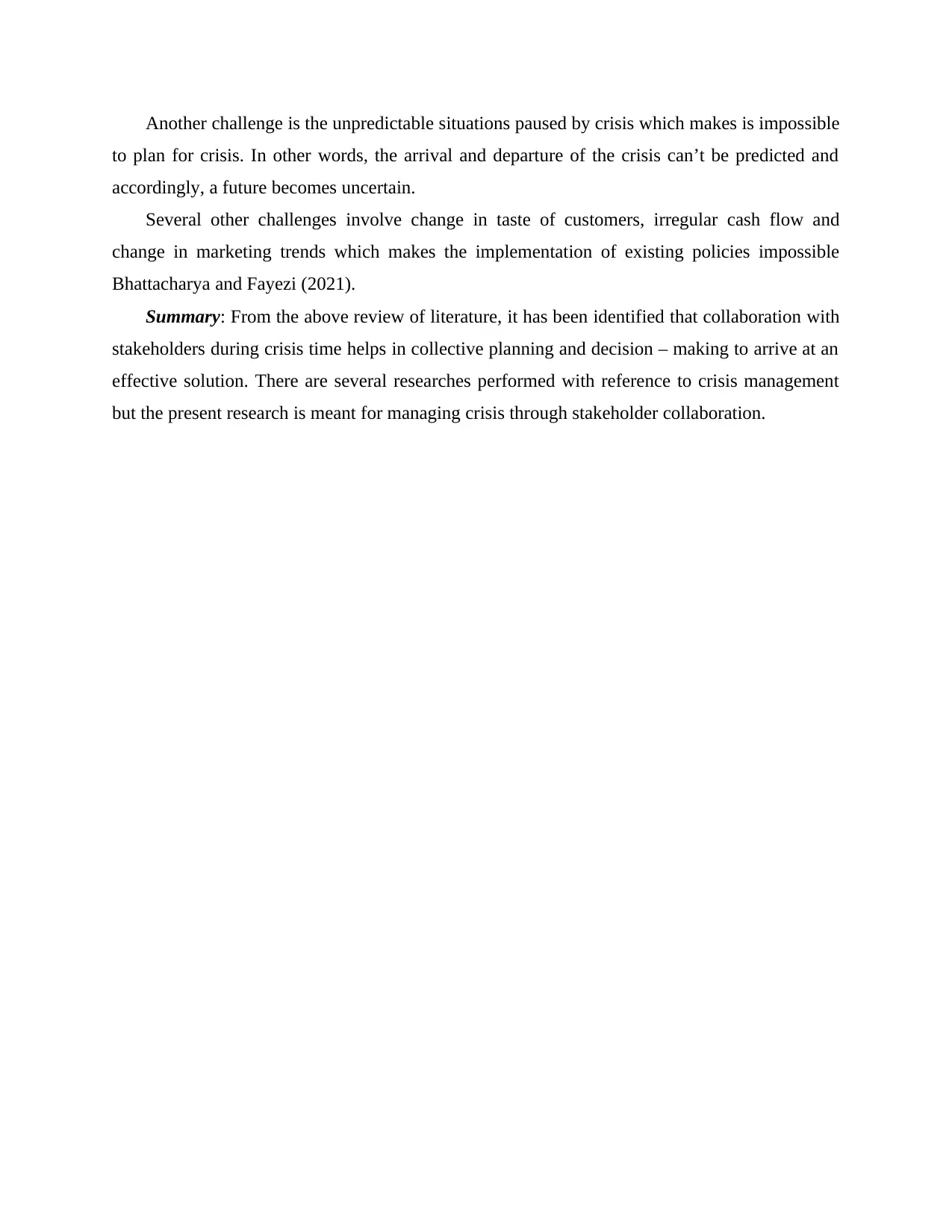
Another challenge is the unpredictable situations paused by crisis which makes is impossible
to plan for crisis. In other words, the arrival and departure of the crisis can’t be predicted and
accordingly, a future becomes uncertain.
Several other challenges involve change in taste of customers, irregular cash flow and
change in marketing trends which makes the implementation of existing policies impossible
Bhattacharya and Fayezi (2021).
Summary: From the above review of literature, it has been identified that collaboration with
stakeholders during crisis time helps in collective planning and decision – making to arrive at an
effective solution. There are several researches performed with reference to crisis management
but the present research is meant for managing crisis through stakeholder collaboration.
to plan for crisis. In other words, the arrival and departure of the crisis can’t be predicted and
accordingly, a future becomes uncertain.
Several other challenges involve change in taste of customers, irregular cash flow and
change in marketing trends which makes the implementation of existing policies impossible
Bhattacharya and Fayezi (2021).
Summary: From the above review of literature, it has been identified that collaboration with
stakeholders during crisis time helps in collective planning and decision – making to arrive at an
effective solution. There are several researches performed with reference to crisis management
but the present research is meant for managing crisis through stakeholder collaboration.
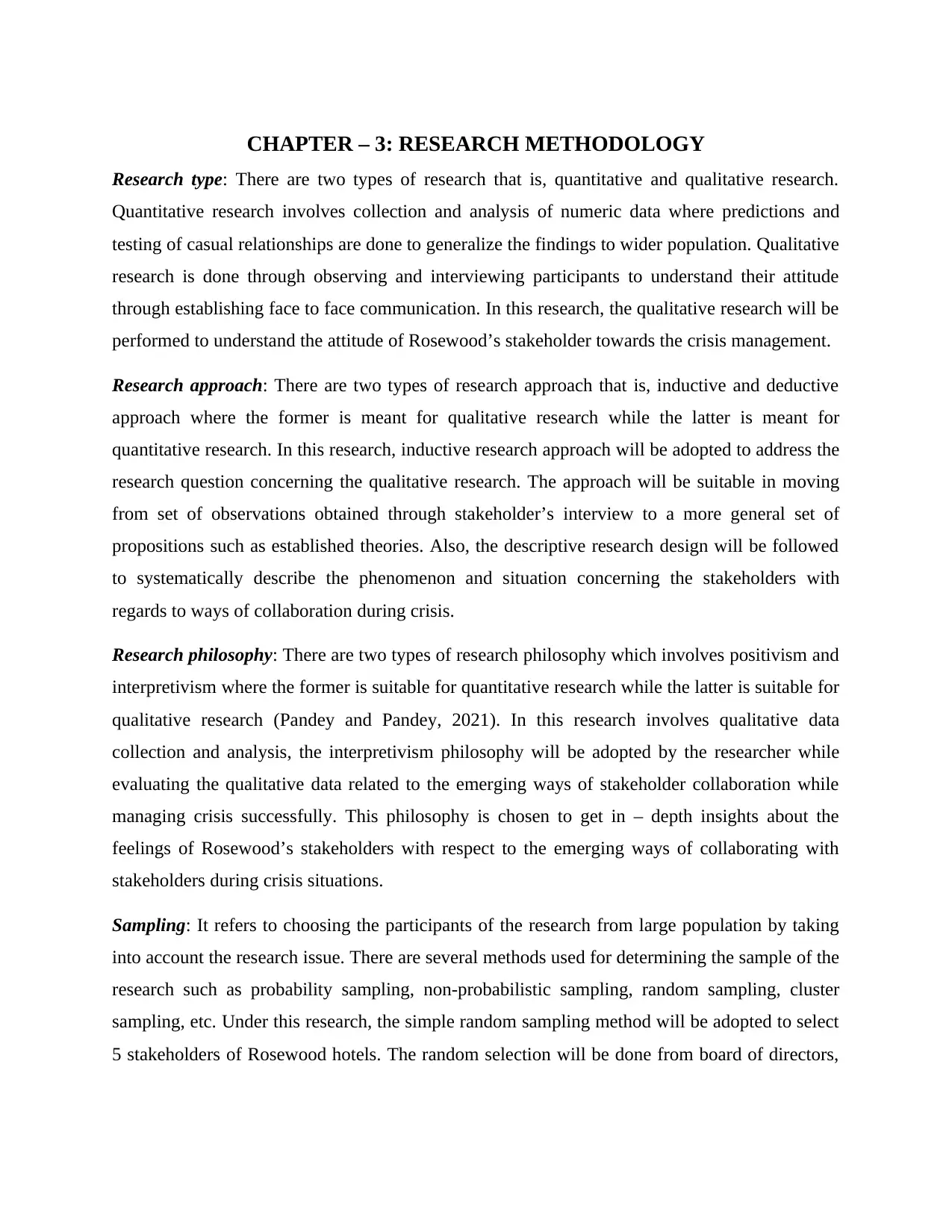
CHAPTER – 3: RESEARCH METHODOLOGY
Research type: There are two types of research that is, quantitative and qualitative research.
Quantitative research involves collection and analysis of numeric data where predictions and
testing of casual relationships are done to generalize the findings to wider population. Qualitative
research is done through observing and interviewing participants to understand their attitude
through establishing face to face communication. In this research, the qualitative research will be
performed to understand the attitude of Rosewood’s stakeholder towards the crisis management.
Research approach: There are two types of research approach that is, inductive and deductive
approach where the former is meant for qualitative research while the latter is meant for
quantitative research. In this research, inductive research approach will be adopted to address the
research question concerning the qualitative research. The approach will be suitable in moving
from set of observations obtained through stakeholder’s interview to a more general set of
propositions such as established theories. Also, the descriptive research design will be followed
to systematically describe the phenomenon and situation concerning the stakeholders with
regards to ways of collaboration during crisis.
Research philosophy: There are two types of research philosophy which involves positivism and
interpretivism where the former is suitable for quantitative research while the latter is suitable for
qualitative research (Pandey and Pandey, 2021). In this research involves qualitative data
collection and analysis, the interpretivism philosophy will be adopted by the researcher while
evaluating the qualitative data related to the emerging ways of stakeholder collaboration while
managing crisis successfully. This philosophy is chosen to get in – depth insights about the
feelings of Rosewood’s stakeholders with respect to the emerging ways of collaborating with
stakeholders during crisis situations.
Sampling: It refers to choosing the participants of the research from large population by taking
into account the research issue. There are several methods used for determining the sample of the
research such as probability sampling, non-probabilistic sampling, random sampling, cluster
sampling, etc. Under this research, the simple random sampling method will be adopted to select
5 stakeholders of Rosewood hotels. The random selection will be done from board of directors,
Research type: There are two types of research that is, quantitative and qualitative research.
Quantitative research involves collection and analysis of numeric data where predictions and
testing of casual relationships are done to generalize the findings to wider population. Qualitative
research is done through observing and interviewing participants to understand their attitude
through establishing face to face communication. In this research, the qualitative research will be
performed to understand the attitude of Rosewood’s stakeholder towards the crisis management.
Research approach: There are two types of research approach that is, inductive and deductive
approach where the former is meant for qualitative research while the latter is meant for
quantitative research. In this research, inductive research approach will be adopted to address the
research question concerning the qualitative research. The approach will be suitable in moving
from set of observations obtained through stakeholder’s interview to a more general set of
propositions such as established theories. Also, the descriptive research design will be followed
to systematically describe the phenomenon and situation concerning the stakeholders with
regards to ways of collaboration during crisis.
Research philosophy: There are two types of research philosophy which involves positivism and
interpretivism where the former is suitable for quantitative research while the latter is suitable for
qualitative research (Pandey and Pandey, 2021). In this research involves qualitative data
collection and analysis, the interpretivism philosophy will be adopted by the researcher while
evaluating the qualitative data related to the emerging ways of stakeholder collaboration while
managing crisis successfully. This philosophy is chosen to get in – depth insights about the
feelings of Rosewood’s stakeholders with respect to the emerging ways of collaborating with
stakeholders during crisis situations.
Sampling: It refers to choosing the participants of the research from large population by taking
into account the research issue. There are several methods used for determining the sample of the
research such as probability sampling, non-probabilistic sampling, random sampling, cluster
sampling, etc. Under this research, the simple random sampling method will be adopted to select
5 stakeholders of Rosewood hotels. The random selection will be done from board of directors,
⊘ This is a preview!⊘
Do you want full access?
Subscribe today to unlock all pages.

Trusted by 1+ million students worldwide
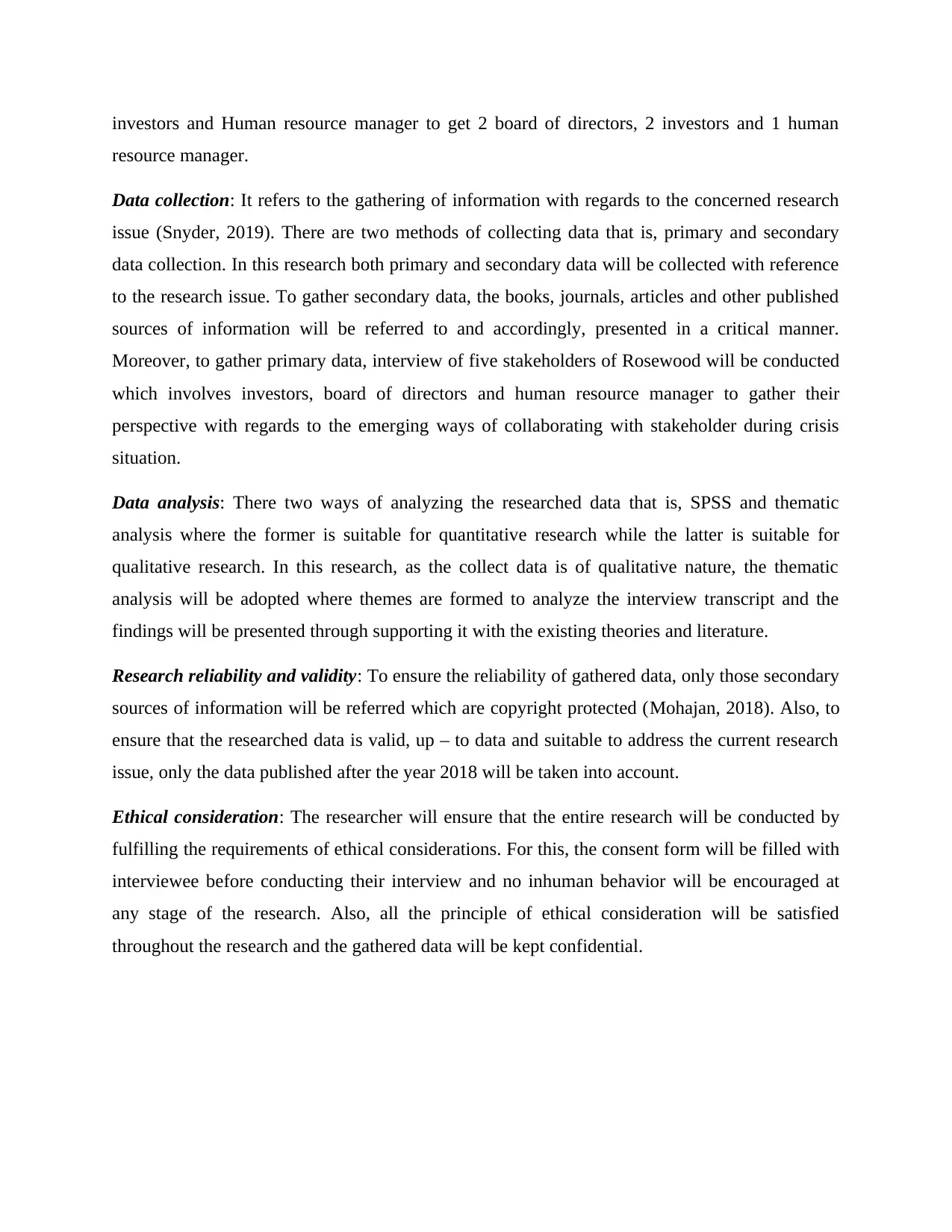
investors and Human resource manager to get 2 board of directors, 2 investors and 1 human
resource manager.
Data collection: It refers to the gathering of information with regards to the concerned research
issue (Snyder, 2019). There are two methods of collecting data that is, primary and secondary
data collection. In this research both primary and secondary data will be collected with reference
to the research issue. To gather secondary data, the books, journals, articles and other published
sources of information will be referred to and accordingly, presented in a critical manner.
Moreover, to gather primary data, interview of five stakeholders of Rosewood will be conducted
which involves investors, board of directors and human resource manager to gather their
perspective with regards to the emerging ways of collaborating with stakeholder during crisis
situation.
Data analysis: There two ways of analyzing the researched data that is, SPSS and thematic
analysis where the former is suitable for quantitative research while the latter is suitable for
qualitative research. In this research, as the collect data is of qualitative nature, the thematic
analysis will be adopted where themes are formed to analyze the interview transcript and the
findings will be presented through supporting it with the existing theories and literature.
Research reliability and validity: To ensure the reliability of gathered data, only those secondary
sources of information will be referred which are copyright protected (Mohajan, 2018). Also, to
ensure that the researched data is valid, up – to data and suitable to address the current research
issue, only the data published after the year 2018 will be taken into account.
Ethical consideration: The researcher will ensure that the entire research will be conducted by
fulfilling the requirements of ethical considerations. For this, the consent form will be filled with
interviewee before conducting their interview and no inhuman behavior will be encouraged at
any stage of the research. Also, all the principle of ethical consideration will be satisfied
throughout the research and the gathered data will be kept confidential.
resource manager.
Data collection: It refers to the gathering of information with regards to the concerned research
issue (Snyder, 2019). There are two methods of collecting data that is, primary and secondary
data collection. In this research both primary and secondary data will be collected with reference
to the research issue. To gather secondary data, the books, journals, articles and other published
sources of information will be referred to and accordingly, presented in a critical manner.
Moreover, to gather primary data, interview of five stakeholders of Rosewood will be conducted
which involves investors, board of directors and human resource manager to gather their
perspective with regards to the emerging ways of collaborating with stakeholder during crisis
situation.
Data analysis: There two ways of analyzing the researched data that is, SPSS and thematic
analysis where the former is suitable for quantitative research while the latter is suitable for
qualitative research. In this research, as the collect data is of qualitative nature, the thematic
analysis will be adopted where themes are formed to analyze the interview transcript and the
findings will be presented through supporting it with the existing theories and literature.
Research reliability and validity: To ensure the reliability of gathered data, only those secondary
sources of information will be referred which are copyright protected (Mohajan, 2018). Also, to
ensure that the researched data is valid, up – to data and suitable to address the current research
issue, only the data published after the year 2018 will be taken into account.
Ethical consideration: The researcher will ensure that the entire research will be conducted by
fulfilling the requirements of ethical considerations. For this, the consent form will be filled with
interviewee before conducting their interview and no inhuman behavior will be encouraged at
any stage of the research. Also, all the principle of ethical consideration will be satisfied
throughout the research and the gathered data will be kept confidential.
Paraphrase This Document
Need a fresh take? Get an instant paraphrase of this document with our AI Paraphraser
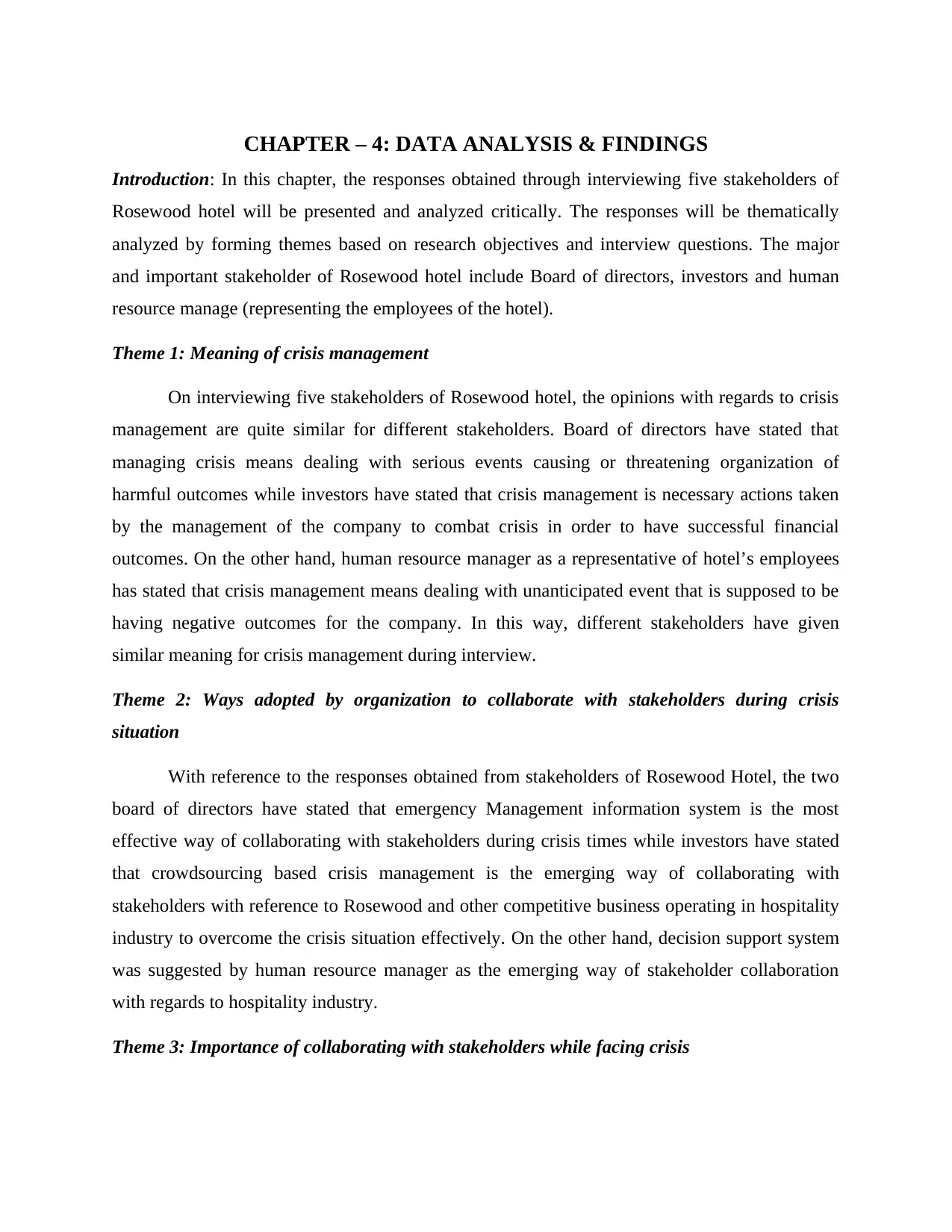
CHAPTER – 4: DATA ANALYSIS & FINDINGS
Introduction: In this chapter, the responses obtained through interviewing five stakeholders of
Rosewood hotel will be presented and analyzed critically. The responses will be thematically
analyzed by forming themes based on research objectives and interview questions. The major
and important stakeholder of Rosewood hotel include Board of directors, investors and human
resource manage (representing the employees of the hotel).
Theme 1: Meaning of crisis management
On interviewing five stakeholders of Rosewood hotel, the opinions with regards to crisis
management are quite similar for different stakeholders. Board of directors have stated that
managing crisis means dealing with serious events causing or threatening organization of
harmful outcomes while investors have stated that crisis management is necessary actions taken
by the management of the company to combat crisis in order to have successful financial
outcomes. On the other hand, human resource manager as a representative of hotel’s employees
has stated that crisis management means dealing with unanticipated event that is supposed to be
having negative outcomes for the company. In this way, different stakeholders have given
similar meaning for crisis management during interview.
Theme 2: Ways adopted by organization to collaborate with stakeholders during crisis
situation
With reference to the responses obtained from stakeholders of Rosewood Hotel, the two
board of directors have stated that emergency Management information system is the most
effective way of collaborating with stakeholders during crisis times while investors have stated
that crowdsourcing based crisis management is the emerging way of collaborating with
stakeholders with reference to Rosewood and other competitive business operating in hospitality
industry to overcome the crisis situation effectively. On the other hand, decision support system
was suggested by human resource manager as the emerging way of stakeholder collaboration
with regards to hospitality industry.
Theme 3: Importance of collaborating with stakeholders while facing crisis
Introduction: In this chapter, the responses obtained through interviewing five stakeholders of
Rosewood hotel will be presented and analyzed critically. The responses will be thematically
analyzed by forming themes based on research objectives and interview questions. The major
and important stakeholder of Rosewood hotel include Board of directors, investors and human
resource manage (representing the employees of the hotel).
Theme 1: Meaning of crisis management
On interviewing five stakeholders of Rosewood hotel, the opinions with regards to crisis
management are quite similar for different stakeholders. Board of directors have stated that
managing crisis means dealing with serious events causing or threatening organization of
harmful outcomes while investors have stated that crisis management is necessary actions taken
by the management of the company to combat crisis in order to have successful financial
outcomes. On the other hand, human resource manager as a representative of hotel’s employees
has stated that crisis management means dealing with unanticipated event that is supposed to be
having negative outcomes for the company. In this way, different stakeholders have given
similar meaning for crisis management during interview.
Theme 2: Ways adopted by organization to collaborate with stakeholders during crisis
situation
With reference to the responses obtained from stakeholders of Rosewood Hotel, the two
board of directors have stated that emergency Management information system is the most
effective way of collaborating with stakeholders during crisis times while investors have stated
that crowdsourcing based crisis management is the emerging way of collaborating with
stakeholders with reference to Rosewood and other competitive business operating in hospitality
industry to overcome the crisis situation effectively. On the other hand, decision support system
was suggested by human resource manager as the emerging way of stakeholder collaboration
with regards to hospitality industry.
Theme 3: Importance of collaborating with stakeholders while facing crisis
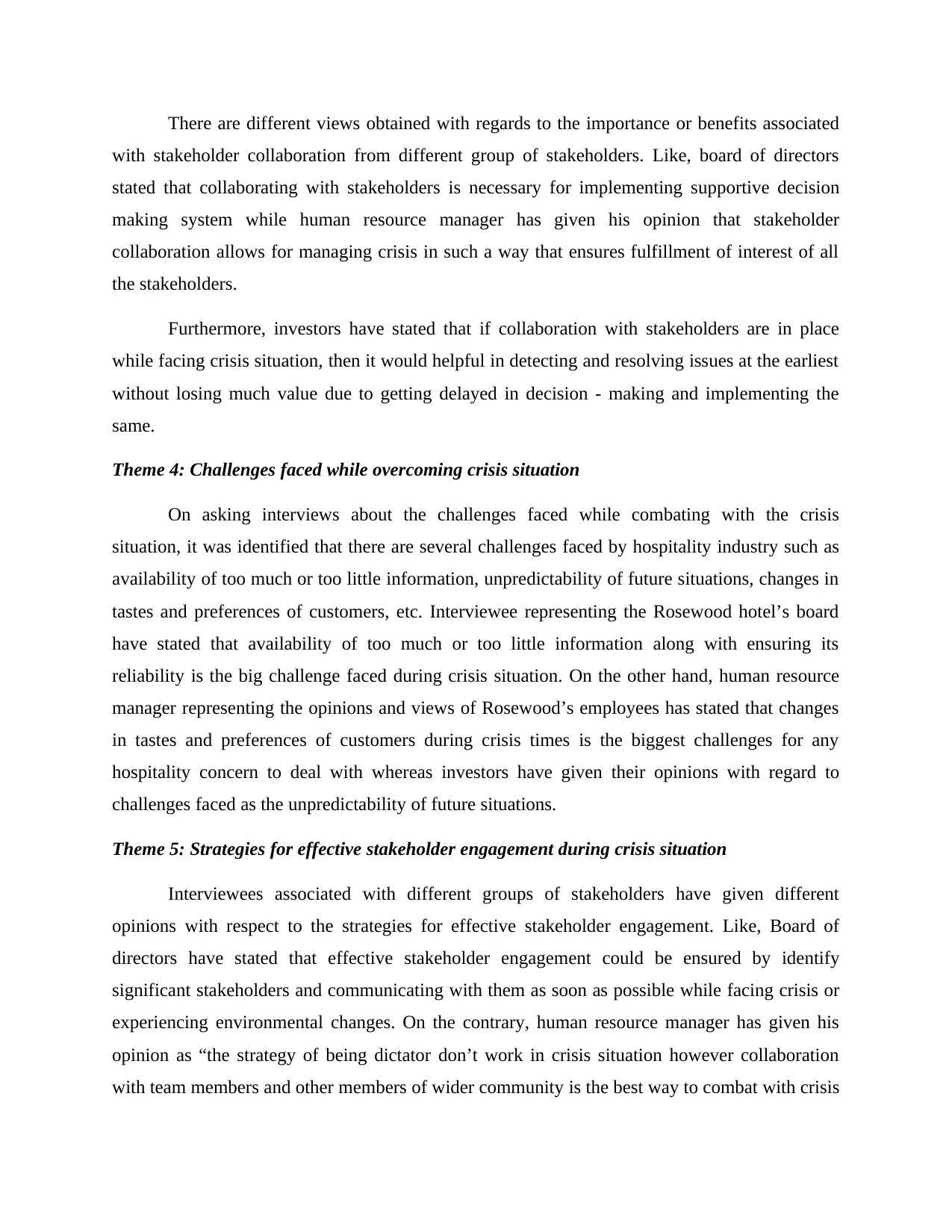
There are different views obtained with regards to the importance or benefits associated
with stakeholder collaboration from different group of stakeholders. Like, board of directors
stated that collaborating with stakeholders is necessary for implementing supportive decision
making system while human resource manager has given his opinion that stakeholder
collaboration allows for managing crisis in such a way that ensures fulfillment of interest of all
the stakeholders.
Furthermore, investors have stated that if collaboration with stakeholders are in place
while facing crisis situation, then it would helpful in detecting and resolving issues at the earliest
without losing much value due to getting delayed in decision - making and implementing the
same.
Theme 4: Challenges faced while overcoming crisis situation
On asking interviews about the challenges faced while combating with the crisis
situation, it was identified that there are several challenges faced by hospitality industry such as
availability of too much or too little information, unpredictability of future situations, changes in
tastes and preferences of customers, etc. Interviewee representing the Rosewood hotel’s board
have stated that availability of too much or too little information along with ensuring its
reliability is the big challenge faced during crisis situation. On the other hand, human resource
manager representing the opinions and views of Rosewood’s employees has stated that changes
in tastes and preferences of customers during crisis times is the biggest challenges for any
hospitality concern to deal with whereas investors have given their opinions with regard to
challenges faced as the unpredictability of future situations.
Theme 5: Strategies for effective stakeholder engagement during crisis situation
Interviewees associated with different groups of stakeholders have given different
opinions with respect to the strategies for effective stakeholder engagement. Like, Board of
directors have stated that effective stakeholder engagement could be ensured by identify
significant stakeholders and communicating with them as soon as possible while facing crisis or
experiencing environmental changes. On the contrary, human resource manager has given his
opinion as “the strategy of being dictator don’t work in crisis situation however collaboration
with team members and other members of wider community is the best way to combat with crisis
with stakeholder collaboration from different group of stakeholders. Like, board of directors
stated that collaborating with stakeholders is necessary for implementing supportive decision
making system while human resource manager has given his opinion that stakeholder
collaboration allows for managing crisis in such a way that ensures fulfillment of interest of all
the stakeholders.
Furthermore, investors have stated that if collaboration with stakeholders are in place
while facing crisis situation, then it would helpful in detecting and resolving issues at the earliest
without losing much value due to getting delayed in decision - making and implementing the
same.
Theme 4: Challenges faced while overcoming crisis situation
On asking interviews about the challenges faced while combating with the crisis
situation, it was identified that there are several challenges faced by hospitality industry such as
availability of too much or too little information, unpredictability of future situations, changes in
tastes and preferences of customers, etc. Interviewee representing the Rosewood hotel’s board
have stated that availability of too much or too little information along with ensuring its
reliability is the big challenge faced during crisis situation. On the other hand, human resource
manager representing the opinions and views of Rosewood’s employees has stated that changes
in tastes and preferences of customers during crisis times is the biggest challenges for any
hospitality concern to deal with whereas investors have given their opinions with regard to
challenges faced as the unpredictability of future situations.
Theme 5: Strategies for effective stakeholder engagement during crisis situation
Interviewees associated with different groups of stakeholders have given different
opinions with respect to the strategies for effective stakeholder engagement. Like, Board of
directors have stated that effective stakeholder engagement could be ensured by identify
significant stakeholders and communicating with them as soon as possible while facing crisis or
experiencing environmental changes. On the contrary, human resource manager has given his
opinion as “the strategy of being dictator don’t work in crisis situation however collaboration
with team members and other members of wider community is the best way to combat with crisis
⊘ This is a preview!⊘
Do you want full access?
Subscribe today to unlock all pages.

Trusted by 1+ million students worldwide
1 out of 24
Related Documents
Your All-in-One AI-Powered Toolkit for Academic Success.
+13062052269
info@desklib.com
Available 24*7 on WhatsApp / Email
![[object Object]](/_next/static/media/star-bottom.7253800d.svg)
Unlock your academic potential
Copyright © 2020–2026 A2Z Services. All Rights Reserved. Developed and managed by ZUCOL.





